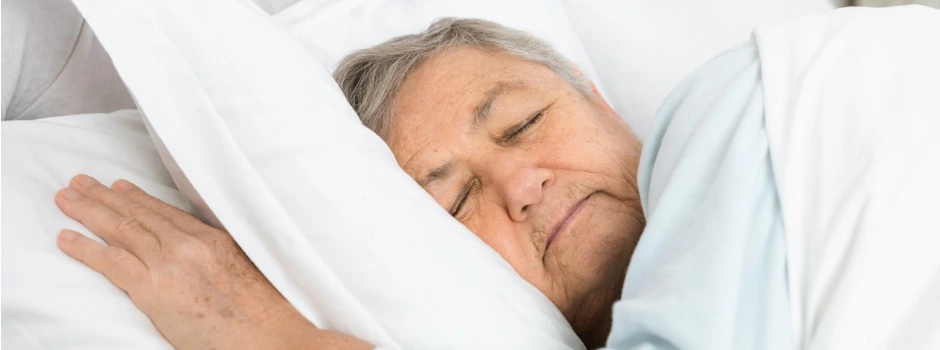We are supposed to spend one-third of our lives sleeping. Older adults need about seven to nine hours each night, about the same as all adults. But
various factors can make it harder for older adults to get enough rest, including anxiety, sickness, pain, or certain medications.
Dr. Peter Rajacic, medical director at InnovAge’s
Allegheny Center in Pennsylvania, is also a sleep expert. He coaches seniors and others on good sleep hygiene with questions such as: “Do I have a hard time falling asleep? Do I wake up a lot throughout the night? Do I fall asleep easily during the daytime?"
Sleep hygiene, or the habits that contribute to healthy sleep, is important and needs to be maintained. So, what are these habits?
- Consistent schedule: Go to sleep and get up at the same time each day. Rajacic says having to change bedtime or wake-up times can make it difficult for our bodies to anticipate an appropriate period of time for sleep.
- Limit naps: While an afternoon nap can feel great and boost your energy, it can also impact your sleep later that night. “If you do need a nap, make it 30 minutes or less,” says Rajacic. “If you find yourself needing longer and more frequent naps, it may be a sign your sleep is in poor shape.”
- Wind down: Try to relax before going to sleep. Take 30 minutes to immerse yourself in an activity that you find soothing, such as a relaxing read or meditative music. Avoid anything that may cause stress or increase anxiety, such as watching an action flick or thriller.
- Avoid lights and electronics: Melatonin, the hormone that regulates sleep, is affected by light. The higher the melatonin levels, the more the body is ready for sleep. “Avoid bright lights,” says Rajacic. “Bright lights drop melatonin levels in your body and tell your body it is not ready for sleep. Electronics (such as phones, computers, and TVs) have a similar effect because they often expose eyes to bright light. Avoid bright lights and electronics 30 to 60 minutes before bedtime.
- Limit activities in bed: Try to keep sleep and sex as the only activities performed in bed. By limiting your bed to these activities, your body will associate your bed with time for sleep. “If you wake up and have difficulty falling asleep for more than 30 minutes, then leave your bed and engage in an activity that you find sleepy,” he says. “Once you feel sleepy, return to bed.”
- Diet and exercise: Avoid eating late or before bedtime. In addition to sleep effects, research suggests having dinner four hours prior to bedtime, compared to two hours, can result in weight loss without needing to reduce calories. Regular exercise can also make it easier to fall asleep.
- Tobacco and alcohol: Research shows a strong link between tobacco use and insomnia. Nicotine is a known stimulant and therefore makes it harder to fall asleep. Alcohol, while known as a depressant, is used by some as a sleep aid. But, alcohol can suppress the REM (rapid-eye movement) part of your sleep, which is responsible for dreams and the many restorative properties of sleep. “A good rule of thumb,” says Rajacic, “is if you are drinking one alcoholic beverage, then plan to finish it one hour prior to bedtime.”
InnovAge’s
Program of All-inclusive Care for the Elderly (PACE) offers
coordinated healthcare that includes
in-home care, transportation, therapy, medication management, nutrition, dental and vision, specialty care coordination, and more. Find out if InnovAge PACE is a good fit for you or your loved one by taking this
self-assessment.
This article was medically reviewed by
Richard Feifer, M.D., MPH, FAPC. The information in this article and on InnovAge’s website is not a substitute for professional medical advice, diagnosis, or treatment. Always seek the advice of your physician or other qualified healthcare provider with any questions regarding a medical condition or treatment and before undertaking a new healthcare regimen.
